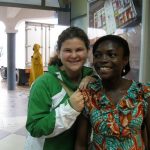SATURDAY, June 25th
I’m meeellllttttinngggg…
Not really, but it sure feels like it… it’s almost six in the morning, and I already feel like I’m boiling alive. The cold shower helped, but clearly I brought the wrong clothes for this venture – which is all the more incentive to begin a shopping spree immediately.
There’s not much to be said about the plane flight here, which was rather uneventful but (true to Ghanaian form) a little delayed at the beginning. We landed on the tarmac and I finally got my first real view of Ghana.
Walking through the airport was, I think, a good way to introduce Ghana. It’s a big building, almost industrial, with cracked but colorful painted murals, lawn chairs, and squeaky, squealing baggage belts. When you go through the airport here, you first arrive at Immigration (for me, I went through the “Other Nationals” line). My ears had yet to pop and I was already struggling to hear anyone, so I walked up to the desk, signed and said “I’m deaf, can I please have my friend interpret?” and got Jolene to help me through Immigration.
The rest of the airport isn’t all that updated, so it’s very surprising to see the high tech stuff they had at Immigration: A camera to take your photo and a scanner that took your fingerprints. There was some speculation that perhaps the United States had helped fund these things, but I can’t say for sure (I guess because Kotoka International Airport had been identified as a weak security spot for people entering the USA).
And in fact, “I can’t say for sure” has been the overriding theme of things so far. Yesterday afternoon (it was about 3:00 by the time all of us had unpacked and settled in), we exchanged some money and bought our cell phones. The cell phones are Samsung something (thankfully I have never claimed a great aptitude or patience for technology, so I’m sure it doesn’t shock you that I don’t know exactly what I have!), and I’m not sure how well mine will work. It seems reasonably loud when you turn it all the way up, but it doesn’t have a speaker and I would have to find a quiet space to talk – which is a tall order in Accra, where you are surrounded by people 24/7. I’ve finally warned the rest of the group that I’m probably only using the phone for emergencies unless I can figure out a way to text (which seems possible, so I’m not closing the door on that option just yet).
Internet? Don’t really know. Air conditioners? Oh, they don’t really work in the house. Toilet? Slightly questionable.
I should probably clarify at this point that I’m not really complaining about any of these things. Going into this, I knew the experience in Ghana would be radically different from anything I’ve done before, so I’m taking all of the above in stride. All the things I talk about from here on out – yes, there will be some arguably negative things, some are positive things, and some are things you would never see in the Western world (for better or worse). All of this is simply Ghana. I don’t consider it my place to judge anything. My job is simply to experience things, and try to avoid seeing things from a purely Western view.
Academic caveats aside, in the short time I’ve been here there has been a LOT to see, and I’m not sure I can describe it all adequately. Our first night – last night – we went to a bar with pulsing percussion blaring and ate some dinner. I had Red-Red with chicken and fried plantains. The chicken was amazingly good and very delicious, as were the plantains. The red-red was good, but I suspect it takes some time to really love it (and it’s always possible that other places cook it differently). If pressed to explain red-red at this exact moment, I would pitch it as a tomato-ish based sauce/chili hybrid with black-eyed beans, chopped vegetables and spices, and also particularly good if you mix in jollof rice.
We are staying in a house in East Legon, which apparently is a neighborhood where the middle-to-upper class Ghanaians live. The house itself is much more spacious and modernized than I thought it would be – the way I had heard about it before, I was imagining extremely cramped living quarters and questionable everything. As it is, I’m sharing a room with two others (Michelle and Neethu), and I think we’re all unflappable enough and awesome enough that we can comfortably share a sleeping space for a few weeks. The electricity turns on when you need it to (for now). We may not have air conditioners, but we have fans to circulate air. And later this morning we’re heading to the mall and fruit stand down the street to buy some food (yay, food!).
SATURDAY, June 25th (later that day)
When Leslie (the program coordinator and director) first told me that all the showers in the house only have cold water, my first thought was “No. Just, no.” It’s now time to eat some crow – those cold showers feel WONDERFUL after hours of death-bed sweating and humidity. I was so hot that by the time I used the shower, the water actually felt lukewarm to me. I just wanted to stay in that shower forever. Maybe the street hawkers have a portable version I can use to take around with me?
Street sellers are everywhere in Accra. They line the roads, walk in traffic, and set up shop the busiest corners of Accra. And they quite literally sell anything and everything. I’ve seen typical things such as fruit and clothes, and some not-so-typical things, such as cleaning supplies, clocks, furniture… really, you name it, you can probably find someone selling it. The thing I’m most fascinated by when it comes to street vendors (and there’s a lot to be amazed by!) is the women – they carry HUGE loads of products on their heads, and don’t need to use their hands to support any of it. Imagine a large laundry basket. Fill that basket with about 20 pounds of cleaning supplies or bread or laundry. Add some glass panels for good measure. Put that whole load on your head, walk down the street, and whatever you do, don’t use your hands. That’s how skilled these women are.
This morning, a small group and I headed down the street to buy some fruit from the “Fruit Lady.” I bought a mango for one cedi (about 50 or 60 cents in USA money) and a pineapple for two cedis. I haven’t had the pineapple yet – I’m planning for that to be dessert for the house tonight – but the mango? Blown. Away. It was sweet, ripe, juicy… and probably the best mango I’ve had. I can’t wait for the pineapple.
Walking back… if I had to describe the scene: The roads are red dirt. It’s either dusty and dry, or it’s still muddy from the night rain. To your left are houses, nay, fortresses – the walls are over 6 feet high, there’s barbed wire or glass shards. A construction site is on your right, next to an upscale hotel that would be at home anywhere in SoCal. There are children playing with dogs in the street, sticks, whatever they can get their hands on. The majority of Ghanaians walk – a few bike, even fewer drive. The gutters here are deep and have no covering at all, so you have to take care when walking. Occasionally you’ll see dogs or goats wandering around, nibbling at the grass, and you wonder if they have owners. Trash, debris, litter (whatever you call it) lines the street. Anything from tires to old construction supplies to chickens and lizards can be found in the grassy banks. This neighborhood at least is a peculiar mix of old and new, and distinctively African in more ways than one.
Chicken is a big deal here. Thankfully, it’s done extremely well most of the time (lots of practice?), and usually covered in some kind of delicious sauce. Side options are usually rice, fried plantains, or chips (french fries to Americans). And I will probably have more chicken again (maybe I should try fish for a change) tonight when the group heads off to eat at Chez Afrique. Our group is arriving in batches – I was part of the first wave last night, and now the second wave is rolling in tonight, so we’re off to celebrate!
Oh, and general updates:
– Neethu, Michelle and I may have found a way to cool down our room at night – keep the windows open. There’s a screen to keep out mosquitoes, and because I’m paranoid, I have screened my whole bed off at night. No malaria or dengue fever for this woman!
– We’re still working out food. Some things are cheaper in Ghana, but many things are more expensive, even when counting the exchange rate as a factor. For example, shampoo is easily around nine to ten cedis, depending on what brand you’re looking at. My pasta was about five cedis. And so on. At this rate, I’m more likely to suffer from sticker shock instead of culture shock.



Joyce Fisher
July 4, 2011 — 8:33 pm
Hi, you made a comment, “I think we’re all unflappable enough and awesome enough….”, and I have to tell you, that I’ve never met any of you and I think ALL of you are awesome!!! (Well, that’s not exactly right, I did give birth to Jolene and I met Catharine at breakfast last week.) It just amazes me how all of you are willing to give up your summer, and a lot of your money, to travel around the world on this project. I could never be so brave. Enjoy every minute and I will continue to live vicariously through your stories!
Peace, Love & Joy,
Joyce